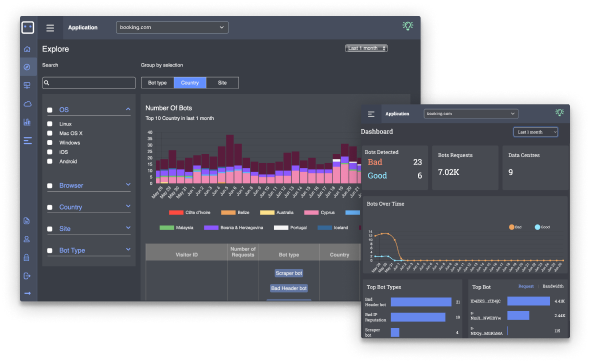Menu
.
Demo Schedule
Fill out the form and one of our experts will be in touch to discuss your bot management needs.
Fill out the form and one of our experts will be in touch to discuss your bot management needs.
Fill out the form and one of our experts will be in touch to discuss your bot management needs.
Fill out the form and one of our experts will be in touch to discuss your bot management needs.
PDF Document
An international airline and its sister hotel-booking platform faced a surge of AI-driven bots that distorted demand data, hoarded inventory, hijacked loyalty accounts, and jeopardized compliance with PCI DSS, IATA NDC, and regional privacy laws.
The engagement started with a proof of concept in detect-only mode, instrumenting VisitorTag across search and booking flows to baseline human vs. bot behavior. AccuBot then generated policy recommendations, including rate-limit thresholds, challenge triggers, crawler permissions, and a WAF Rule Advisory, which were reviewed with the client’s infrastructure team.
Selected controls were implemented by the client on their CDN/WAF, while IntelliFend policies were activated gradually (monitor → challenge → block) within our enforcement layer. Throughout, Push Log was used to track each change and its impact, and thresholds were fine-tuned in real time based on live telemetry.

As the travel brand entered its busiest season, phantom searches began to flood the booking engine, each one a carefully orchestrated strike by automated bots. These phantom availability checks misled the airline’s revenue-management system into believing demand far exceeded reality—fares crept upward, and real customers were greeted with “sold out” messages, even when seats and rooms remained.
Meanwhile, behind the scenes, unscrupulous third parties scraped live fare and rate data in real time. Armed with these stolen prices, they reposted listings on Online Travel Agencies (OTAs) at a discount, undercutting official channels and siphoning off bookings that rightfully belonged to the airline and its hotel partner.
At the same time, another wave of bots employed inventory locking tactics, placing fake holds on seats and rooms as soon as they became available. Genuine travelers, eager to finalize their plans, found their preferred options disappearing in seconds—only to see those inventory blocks vanish moments later, their trust in the brand shaken.

The betrayal extended to passengers’ own accounts. Credential stuffing scripts bombarded the login portal with stolen username and password combinations, hijacking loyalty profiles and draining accumulated points. Customers discovered that their hard-earned miles had vanished overnight, eroding faith in the airline’s security.
When some bots succeeded in booking with stolen card numbers, the fallout hit the bottom line. Reservations made by these scripts were promptly canceled or never claimed—leaving the airline with a tangle of refunds, no-show slots, and expensive chargebacks that threatened profitability.

All the while, these malicious bots hammered the site with high-volume requests, overwhelming servers and slowing page loads. What should have been a seamless booking experience turned into frustration, as genuine users faced sluggish performance or even temporary outages during peak booking windows.
And to compound the damage, fake reviews and duplicate listing sites began to appear across the web. Potential travelers encountered misleading ratings and were steered toward unauthorized booking platforms, further diluting the airline’s brand reputation and damaging its hard-won search rankings.
VisitorTag profiled session behavior at IntelliFend’s enforcement layer—mouse movements, scroll cadence, and request timing—while AccuBot throttled non-human patterns in real time, restoring accurate demand signals.
IETF AI Preferences tags on rate APIs let IntelliFend automatically block unauthorized crawlers, while a “good bot” whitelist permitted only approved search engines and GDS partners.
AccuBot detected rapid repeated hold requests via intent scoring, then applied dynamic rate limits or injected step-up challenges to bot traffic, freeing real inventory.
Behavioral biometrics (typing cadence, navigation flow) plus device reputation triggered MFA only for high-risk logins, blocking 70% of ATO attempts without impacting genuine users.
Real-time fraud detection on payment flows routed high-risk transactions through additional verification, cutting chargebacks by over 65%.
By blocking malicious bots at the CDN layer, IntelliFend improved page-load times by 40% and maintained 98% uptime even at 5× normal traffic.
After IntelliFend went live, fake holds and scalping activity dropped to a negligible baseline, and genuine booking success held near 98% during peak windows.
These technical gains translated directly into business success: customer satisfaction with booking reliability climbed by 25%, and net booking revenue grew by 12% year over year.
Contact us to learn how IntelliFend can protect your ticketing and reservation platform from advanced bot threats, ensure full regulatory compliance, and deliver seamless booking experiences to real customers.
Fill out the form and one of our experts will be in touch to discuss your bot management needs.
